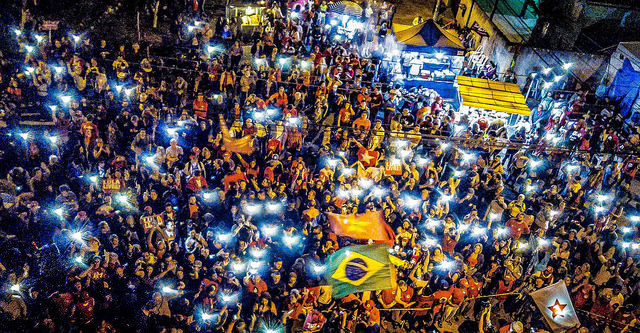The Judiciary in Brazil has lost its shame

On Sunday, July 9, almost a month before the registration of candidacies for the 2018 elections, Brazil saw another regrettable attempt to prevent [former president] Luiz Inacio Lula da Silva from contesting. This was in the aftermath of a habeas corpus petition filed by federal deputies of the Workers’ Party – Wadih Damous and Paulo Teixeira y Paulo Pimenta – contesting the order of the infamous federal judge, Sérgio Moro, which led to the imprisonment of Lula in Curitiba. In response to the petition, Rogério Favretto, the Appeals Judge of the Regional Federal Tribunal of the Fourth Region, ordered the immediate release of the detainee.
The order, issued at 8:30 a.m., and expressly addressed to the Superintendent of the Federal Police in Curitiba, should have been immediately carried out. However, after 12 hours in contempt of the judicial order, unjustified delays and illegal interference by legal authorities, the order was reversed by the President of the Appeals Court, Thompson Flores, who finally ordered that Lula be kept in prison. During those 12 hours, it could be considered that Lula was kidnapped because he should have been freed by then.
Among the most scandalous events of the day were the desperate actions of Judge Sergio Moro who, while enjoying a vacation in Portugal, called the headquarters of the Federal Police to try to prevent the release of Lula and, thus, acted illegally against his superior within the justice system, an Appeals Court judge who received the request for the habeas corpus and who had jurisdiction to rule on a decision on his liberation.
In trying to prevent the compliance with a release order, Moro committed, according to the law, the crime of prevarication, as provided in Article 319 of the Penal Code.
At the same time, another judge – Appeals Court Judge João Pedro Gebran Neto – who participated in Lula’s trial in the second instance, also tried to prevent his release. This is equally inadmissible before Brazilian law.
As has been well determined by democratic jurists, these authoritarian practices, which were allowed during the military regime in Brazil, are incompatible with the precepts of any democratic legal order, with the Brazilian Constitution and the legal codes.
Moreover, and above all, it is evident that the actions of Judges Moro and Neto – both through the non-compliance with the order of habeas corpus, and even outside the process – reveal unquestionable conflict of interest that would make them ineligible to continue exercising jurisdiction in any action regarding the former president and detainee, in accordance with Article 185, IV, of the CPC.
It is important to note that in our country, important sectors of the judiciary have given in to foreign and hidden powers and made the decision to abandon the law to apply acts of exception to prevent and restrict democracy.
For instance, let us consider the Lava-Jato (operation led by the federal police to fight corruption). The way it is being carried out has already caused a serious economic recession in the country, having destroyed companies, industrial sectors and the civil construction sector in the name of fighting widespread corruption. But in this process, those involved have also tried their best to prevent the most popular candidate in the election process from participating in it, which has only served to increase popular outrage and engender a sense of deception and betrayal of democracy.
(Carol Proner is the International Secretary of the Association of Jurists for Democracy, a Ph.D. in Law and Professor at the Federal University of Rio de Janeiro)
